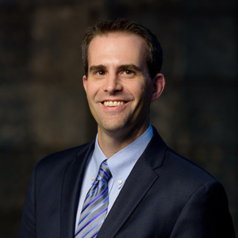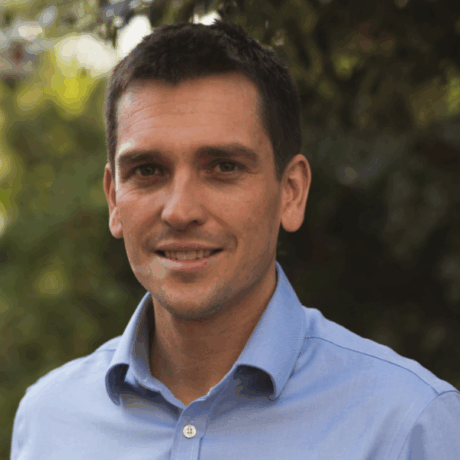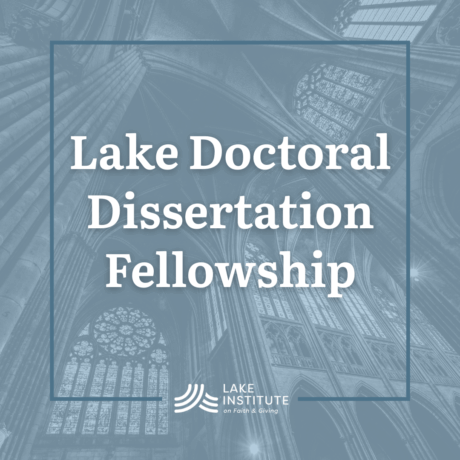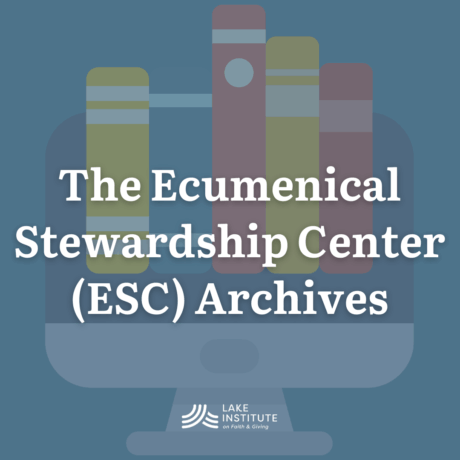What’s in a Word: Stewardship
What’s in a Word: Stewardship
David P. King, PhD, Karen Lake Buttrey Director and Associate Professor, Philanthropic Studies, Lake Institute & Giving

When congregations address the topic of money, “stewardship” is the word most likely used. As we enter the fall stewardship season, particularly for Christian churches, clergy will preach stewardship sermons amplifying themes from the stewardship campaign developed by the stewardship committee as a part of larger efforts in stewardship education. The dominant frame remains clear: when Christian clergy talk about money, giving, or finances in the church, stewardship is the first word they reach for. Yet, a lingering question also remains: if stewardship has become a catch-all to describe any and every reference to finances and fundraising in congregations, can we still use the term to shape cultures of giving and theologies of money in a meaningful way?
Stemming from our initial National Study of Congregations’ Economic Practices’ survey, Lake Institute colleagues interviewed almost 100 congregational leaders to understand their theologies of money. We didn’t ask them directly about stewardship, but that was the language that emerged. Eighty percent of Christian clergy used stewardship terminology unprompted. The number was 94% among mainline Protestant pastors! We’ve written up these findings in an article recently published in the online Religions journal in a wonderful new collection focused on Emerging Trends in Congregational Engagement and Leadership edited by Kristina Lizardy-Hajbi.
What co-author Mark Sampson discovered when returning to these interviews was exactly how clergy employed steward and stewardship as both noun and adjective. As a noun, clergy consistently shared a common theological claim about ownership: if God is the owner of all resources, then we are responsible to steward those resources appropriately. And as a theological claim, stewardship was always about more than money, with references to an all-encompassing “time, talent, and treasure” serving as the most regular response. However, when clergy employed stewardship as an adjective, the focus narrowed considerably with a stricter focus on fundraising and finances. Stewardship modified a time of year (stewardship season), a particular role (stewardship committee), or educational efforts (stewardship class). As the work of the congregation so often follows regular rhythms, stewardship activities similarly fall into predictable cycles and frameworks.
It’s worth noting that stewardship was not always the default word for framing congregational finances and theologies of money. Our article delves into the history of the term, but programmatically, a consistent language of stewardship was taking root in the Protestant vernacular in the first half of the twentieth century. In modes of expansion post-World War II that would envelop the World Council of Churches, U.S. Catholic Bishops, and many other networks as well, denominations and their congregations most often continued to foreground stewardship as the practical container for the ways in which congregations and their leaders sought to raise revenues and manage budgets. There’s little doubt that the history and current use of the term ‘stewardship’ play an unusually significant role in congregational life.
However, just for this reason, we wonder whether stewardship has wandered from its original meaning and has the characteristics of what Catholic priest and philosopher Ivan Illich calls an ‘amoeba word’ – a word that can be put to any conceivable use (2002).¹ As Illich explains, these words are not the same as hackneyed phrases or clichés, but precisely because the word can be used to cover so much ground, it runs the risk of becoming an empty, vague term. If stewardship could mean anything related to ‘responsibility’ or ‘care’ or ‘giving,’ then what does it mean? On the other hand, if in practice it has come to mean the programming related to the giving and managing of money in the church, perhaps it has become overly narrow, calcified, and rigid rather than flexible and broad. Precisely because stewardship could mean anything, it often ends up meaning nothing.
So what do we do with a term like stewardship? Given the clear need for religious leaders to further explore the theological and practical ways they regard the resources necessary to sustain their congregations, is the concept of stewardship up to the task? Does the historic legacy of the term, most clearly shown by ‘stewardship season’ and the connection to tithes and offerings, mean that stewardship is ultimately unable to be effectively used for other purposes? In this sense, stewardship has been calcified—stuck with a historic legacy that it cannot shake. In contrast, does the broad, expansive definition of stewardship—of time, talent, and treasure—and the de-emphasizing of money mean that pastors end up talking less about money than they would like or need to, despite it’s rich theological frame embedded there?
As we see it, perhaps our question serves as an opportunity. It seems as if there is a fork in the road, and there are two options for clergy: either rehabilitate stewardship language or retire it. Either work towards greater congruence between the definition of stewardship and its use, explore more deeply what the nature of a good or wise steward is, or find new language and concepts to think and talk about money and resources. There has always been a robust set of theological frames to consider faith and finances. While we cannot highlight all the credible alternatives here, as faith communities continue to evolve, we believe even greater attention to the economic issues interwoven in their congregations and communities will be necessary. This is a worthwhile, and pressing, task we must engage.
¹Illich, Ivan. 2002. Deschooling Society. London: Marion Boyars.
Stewardship Identifies The Source, But Not The Destination
By Mark Sampson, Co-Founder and Lead Learner at RootedGood

At RootedGood, through the Good Futures Accelerator, we work with congregations across the country to help them explore how they can use their gifts and resources to serve their wider community and generate new forms of revenue. This often involves exploring different ways of using church-owned buildings and land. Congregations are coming up with a wide variety of ideas – from having local low-income food entrepreneurs use their kitchen facilities, to turning the education wing into a non-profit and local business incubator, to building affordable housing and many more. For the congregation, the motivation for this involves both mission and money. Congregations desire to find new ways to connect with and serve the neighborhood and at the same time responding proactively to their challenging financial circumstances. Crucially, we encourage congregations to think about mission and money together, not separately.
Into this new environment, as congregations wrestle with how to think and act regarding money, does the all-too-familiar theological concept of stewardship help? David King, Brad Fulton and I suggest that, ultimately, it does not. Its strength as a concept is in its radical challenge to private property rights, claiming that everything a congregation (and individual) has is not really theirs, it is God’s. While we don’t want congregations to lose this important insight, the theological and practical problem with stewardship is that it doesn’t help answer the question that tends to follow that assertion: ‘what, then, should a congregation do with its money and resources?’ Stewardship identifies the source, but not the direction. It helpfully articulates that a congregation’s buildings and bank accounts are ultimately God’s, but it doesn’t help with the implications. As explored in the article, this means that stewardship ends up being vague and fluid, able to describe almost anything (including a rather odd connection with frugality).
So, what is money for? What are our buildings and land for? What should be their destination, their end? What does ‘good’ look like for the resources of a congregation? At this moment of institutional fragility for many congregations, these are difficult questions to ask. However, they may be the most important.
Mark’s professional career spans the spectrum from profit to non-profit, from start-up to established, and his academic ‘side-hustle’ has focused on the intersection between theology and our contemporary socio-economic context. Mark has a Doctorate in Theology and Economics from King’s College London, with his thesis focusing on social enterprise as ‘faithful economic practice’. Prior to this Mark studied at Regent College, Vancouver, where Mark gained a MA in Theology and Culture and where Mark was also the Interim Director of the Marketplace Institute.
2026 Doctoral Dissertation Fellowship
 Are you a PhD candidate completing a dissertation situated at the intersection of religion and philanthropy or faith and giving? The Lake Institute’s annual Doctoral Dissertation Fellowship offers a one-year grant to support your final year of writing. Visit the link below to submit your application for Lake’s 2026 Doctoral Dissertation Fellowship.
Are you a PhD candidate completing a dissertation situated at the intersection of religion and philanthropy or faith and giving? The Lake Institute’s annual Doctoral Dissertation Fellowship offers a one-year grant to support your final year of writing. Visit the link below to submit your application for Lake’s 2026 Doctoral Dissertation Fellowship.
The Ecumenical Stewardship Center (ESC) Archives

The Ecumenical Stewardship Center (ESC) served Christian faith communities throughout North America, providing thoughtful, practical, and inspirational content on faith and giving from thought leaders and practitioners alike. When they closed their doors in 2021, the leadership of ESC entrusted the archives to Lake Institute on Faith & Giving, which included the development of the Resource Library to house the various resources they created. This included Giving Magazine, which was published annually from 1999 until 2018 (volumes 1-20), and then quarterly in 2019 and 2020 (volumes 21-28) in digital form only.
Subscribe
Insights is a bi-weekly e-newsletter for the religious community and fundraisers of faith-based organizations that provides:
- Reflections on important developments in the field of faith and giving
- Recommended books, studies and articles
- Upcoming Lake Institute events

